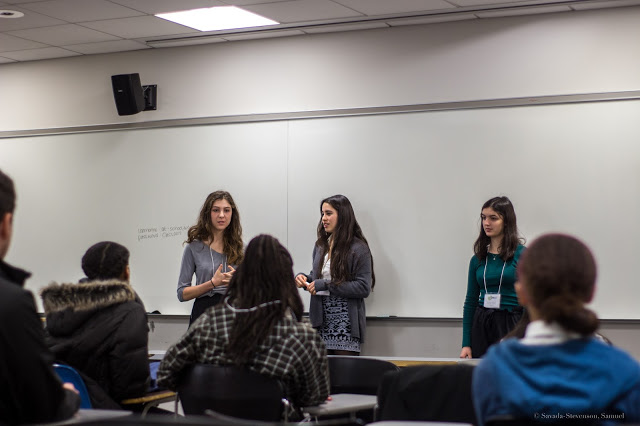The Global Issues Network Conference, held this year at George Washington University, allowed students to present to and inform attendees about a certain global issue that stands out to them. Celeste Bloom, a 10th-grade student presenter from WIS at this year’s GIN conference, is particularly interested in gender stereotypes in children’s literature and rape culture.
“Stories, in general, influenced me a lot when I was younger, and not just in terms of gender, but in terms of the way I viewed certain groups of people, and sometimes they were very stereotypical”, she said, adding that as she grew older and gained more knowledge on the subject, that “it was important to call attention” to those social norms.
A large part of Bloom’s presentation was focused on where these stereotypes originate. “You have three main influences” she states, “parents, school, and stories.”
Parents, she adds, can either choose to “disregard or enforce gender stereotypes … and they can either give [the child] options or limit them in this way”. This “can also lead to later problems, which trivializes sexual assault,” Bloom said.
The second influence, school, is based on different teachers’ expectations. “Teachers normally like the girls because they are quieter in class … and the boys are more athletic.” Moving into high school, however, “success is very gender-based,” in regards to what is looked at as successful for a man to do, and what a woman will be perceived badly as for doing. Boys are expected to excel in the more ‘manly’ things, and the girls are looked at as more dainty, or not as smart as the boys.
The third and most important aspect are stories. Stories “influence the mentality of gender stereotypes a lot,” she stated, “and they can either define them, or they can enforce them,” Bloom said. Stories are everywhere, and we read many of them as we are growing up. This permanently affects our mentality and views in the future.

Bloom wrote a children’s book for her 10th-grade project, titled “That’s A Secret”. It features a girl who is a knight, and a boy who aspires to be a cook. She wanted to reverse stereotypes that are prevalent in most, if not all children’s books. Expanding on her idea, Bloom talked about how it is important for these stereotypes to be eradicated, because what children are exposed to in books while they’re young can lead to serious issues like sexual assault in the future.
“Are we lacking female protagonists?” she asked. “Many books will explicitly say if they are for boys or girls.” The media now has a certain mentality that “can bring about eating disorders, bullying, and often silences women on sexual assault,” she added, what we need to do is “change the media’s representation of men and women.”
Victim blaming is yet another major problem, according to Bloom. About two-thirds of rape cases are not reported, and about 90 percent of people get away with rape. Bloom believes that we are “teaching women how to avoid rape, instead of teaching men not to rape,” and that a possible solution to reducing rape numbers is to make sure that we teach more men that raping is wrong, instead of protecting women against them.
Stereotypes and social norms are “very prominent now with the #MeToo [movement], and a lot of women … have come forward about cases of sexual assault with people … who have an important role in society … who have been reported, so I think it is very important in that sense,” Bloom said to conclude her presentation.
She suggests that what we can do to help is to avoid conforming to gender stereotypes, and help victims of sexual assault and take them seriously. In addition, we cannot allow people to trivialize rape, we need to define consent clearly, and also change the media’s representation of men and women. There is a lot to be done to resolve this problem, but just doing a little bit will go a long way.
Imani Nkrumah Ardayfio was an attendee of the GIN conference this year. “I found Celeste’s presentation very interesting. I found it thought-provoking and empowering; all she said was true and was essential information for the world to hear,” Ardayfio said.
By Ava Dwyer

































































